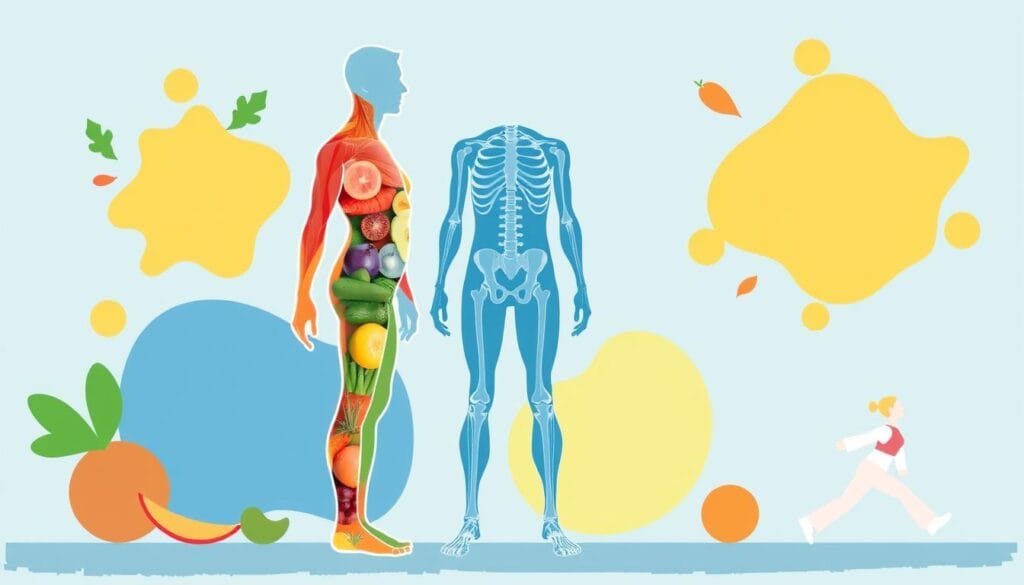I’ve struggled with weight changes before. But I found that natural, long-term strategies are key to a healthier life. In this article, I’ll share the natural weight loss tips that changed my life. They can do the same for you.
Ever thought about losing weight without harming your health? True weight loss needs a holistic approach. It’s not just about physical changes, but also mental and emotional ones. Are you ready to start a journey to a healthier, more vibrant you?
Key Takeaways
- Sustainable weight loss comes from healthy eating, exercise, and lifestyle changes.
- Knowing how calories work and metabolism is key to losing weight naturally.
- Mindful eating, portion control, and healthy food relationships are crucial for lasting success.
- Using intermittent fasting and metabolic-boosting activities can help with fat loss.
- Managing stress, getting enough sleep, and tracking progress are important for keeping weight off and improving well-being.
Understanding the Science Behind Sustainable Weight Loss
Getting to a healthy weight isn’t just about eating less. It’s about how your body, metabolism, and food intake work together. Learning about weight loss science helps you reach your goals and keep a healthy lifestyle.
How Your Body Processes Calories
Our bodies are amazing at turning food into energy. This process, called metabolism, is what helps us burn calories and lose fat. How many calories we burn changes based on our age, gender, muscle, and how active we are.
The Role of Metabolism in Fat Burning
Metabolism is key to burning fat. A quicker metabolism means your body turns food into energy better, not fat. Knowing what affects your metabolism helps you boost it and create a calorie deficit for lasting weight loss.
Creating a Caloric Deficit Naturally
Weight loss starts with a calorie deficit, where you burn more than you eat. But it doesn’t have to be extreme. Small, doable changes in your diet and life can help you lose weight naturally without hurting your health.
| Metric | Explanation | Impact on Weight Loss |
|---|---|---|
| Calorie Intake | The number of calories consumed through food and drinks | Reducing calorie intake creates a calorie deficit, leading to weight loss |
| Metabolic Rate | The rate at which your body burns calories, influenced by factors like age, muscle mass, and activity levels | Increasing metabolic rate boosts the number of calories burned, contributing to weight loss |
| Calorie Expenditure | The number of calories burned through physical activity and daily tasks | Increasing calorie expenditure creates a calorie deficit, leading to weight loss |
“Sustainable weight loss is not about quick fixes, but rather a holistic approach that considers your body’s unique needs and capabilities.”
Essential Steps to Begin Your Weight Loss Journey
Starting a weight loss journey can be thrilling and scary at the same time. But with the right mindset and a clear plan, you can reach your goals and live a healthier life. Let’s look at the key steps to start your weight loss journey and set yourself up for success.
Set Realistic Goals
The first step is to set realistic goals. Don’t aim for the moon, as it can lead to disappointment. Instead, aim for goals that are within reach and align with your health goals. Think about your current weight, body type, and what you want to achieve to set a good timeline and goals.
Prepare Mentally
Weight loss is not just about changing your body; it’s also about your mind and emotions. Take time to think about why you want to lose weight and what might stop you. Imagine the positive changes you’ll see and feel. This mental prep will help you stay strong when things get tough.
Embrace Gradual Lifestyle Changes
Real weight loss comes from making small, lasting changes. Focus on eating well, moving more, and developing healthy habits like managing stress and sleeping enough. Remember, small steps can add up to big changes over time.
By following these steps, you can start a successful weight loss journey and build a healthier lifestyle. Enjoy the journey, celebrate your small wins, and be kind to yourself as you make this big change.

The Power of Mindful Eating for Long-term Success
Getting to a healthy weight isn’t just about counting calories. It’s about understanding your food habits and eating mindfully. Mindful eating helps you manage your weight and feel better overall.
Practicing Portion Control
Learning to control your portions is key in mindful eating. It’s not about starving yourself, but about eating the right amount. Mindful eating teaches you to eat slowly and listen to your body’s hunger and fullness signals. This way, you avoid eating too much and develop a healthy food relationship.
Understanding Hunger vs. Emotional Eating
Sometimes, we eat because we’re feeling emotional, not hungry. Mindful eating helps you tell the difference and eat only when you’re really hungry. By listening to your body, you can find other ways to deal with feelings, not food.
Developing Healthy Eating Habits
- Create a peaceful, distraction-free environment for meals.
- Engage all your senses when eating, from the aroma to the texture of your food.
- Slow down and take the time to chew your food thoroughly.
- Tune in to your body’s signals of hunger and fullness.
- Embrace the joy and satisfaction of mindful, nourishing meals.
By adopting these habits, you’ll enjoy the benefits of mindful eating. You’ll also manage your weight better and have a healthier relationship with food.
Smart Nutrition Choices That Support Fat Loss
Shedding extra pounds starts with making healthy eating choices. Focus on foods rich in nutrients and balanced meals. This fuels your body and helps you lose fat.
Getting enough protein is key for weight loss. It keeps you full and helps keep muscle mass. Include lean proteins like chicken, fish, tofu, or Greek yogurt in your diet.
- Prioritize whole, unprocessed foods like fruits, vegetables, whole grains, and healthy fats.
- Limit added sugars, refined carbs, and unhealthy fats to avoid weight loss setbacks.
- Drink plenty of water to control hunger and aid digestion.
Controlling portion sizes is also crucial. Be aware of calorie intake and listen to your hunger. Use smaller plates and eat slowly to avoid overeating.
| Nutrient-Dense Foods for Healthy Eating | Portion Sizes for Nutrition for Weight Loss |
|---|---|
|
|
By choosing smart nutrition and making it part of your life, you’ll reach your weight loss goals. This supports a healthier lifestyle.

Effective Exercise Routines for Maximum Results
To reach your weight loss goals, you need a fitness plan that includes cardio and strength training. This mix helps you burn fat and build a leaner body.
Combining Cardio and Strength Training
It’s important to do both cardio and strength training to lose weight. Cardio activities like running or swimming raise your heart rate and burn calories. Strength training, on the other hand, builds muscle and increases your metabolism.
- Do at least 150 minutes of moderate cardio or 75 minutes of vigorous cardio weekly.
- Also, do 2-3 strength training sessions a week, focusing on major muscle groups.
- Vary your workouts to keep your body challenged and avoid plateaus.
Best Time to Exercise for Fat Burning
The timing of your workouts can affect fat burning. Exercising in the morning, before eating, may be the most effective.
“Working out on an empty stomach can help your body tap into fat stores for energy, leading to greater fat loss over time.” – Fitness Expert, John Doe
But, the best time to exercise is what fits your schedule and lifestyle. The goal is to find a routine you can stick to.
Recovery and Rest Importance
Rest and recovery are just as crucial as your workouts. They help repair muscles, refill energy, and get you ready for the next workout.
- Try to sleep 7-9 hours each night.
- Do active recovery like yoga or light walking on rest days.
- Listen to your body and take breaks when needed.
By combining cardio, strength training, and rest, you’ll achieve lasting weight loss and a healthier life.
Leveraging Intermittent Fasting for Weight Loss
I’ve found intermittent fasting to be a game-changer for weight loss. It involves alternating between eating and fasting. This lets your body use stored fat for energy.
Intermittent fasting helps you eat less without feeling hungry all the time. By eating only during certain hours, you naturally eat fewer calories. This can lead to losing weight and improving your health.
There are many ways to do intermittent fasting. The 16:8 method is popular, where you eat for 8 hours and fast for 16. The 5:2 method is another good choice, where you eat normally for 5 days and limit calories to 500-600 on the other 2 days.
| Intermittent Fasting Method | Fasting Duration | Eating Window |
|---|---|---|
| 16:8 | 16 hours | 8 hours |
| 5:2 | 2 days per week | 5 days per week |
Try different methods to find what works best for you. Listen to your body and adjust as needed for a successful weight loss journey.
“Intermittent fasting has been a game-changer for my weight loss journey. It has helped me achieve my goals while still allowing me to enjoy the foods I love in moderation.”
Adding intermittent fasting to your weight loss plan can be very effective. It works well with a healthy diet and exercise. Try it and see the amazing results for yourself!
Natural Ways to Boost Your Metabolism
Boosting your metabolism can change the game for weight loss. Simple lifestyle changes can increase your body’s fat-burning power. This supports a healthier weight management journey.
Foods That Increase Metabolic Rate
Some foods can boost your metabolism. Add these metabolism-boosting foods to your diet:
- Lean proteins like chicken, turkey, and fish
- Spicy foods containing capsaicin, such as chili peppers and cayenne
- Green tea, which is rich in catechins that may enhance calorie burn
- Whole grains like oats and quinoa, which require more energy to digest
- Nuts and seeds, which provide healthy fats and fiber to fuel your body
Lifestyle Changes for Better Metabolism
Changing your lifestyle can also boost your metabolism. Here are some tips:
- Engage in regular exercise – A mix of cardio and strength training builds muscle. This increases your resting metabolic rate.
- Prioritize quality sleep – Aim for 7-9 hours of sleep per night. Lack of sleep can slow down your metabolism.
- Manage stress effectively – Chronic stress can disrupt hormonal balance and negatively impact your metabolism. Try stress-reducing activities like meditation or yoga.
- Stay hydrated – Drinking plenty of water throughout the day can help support metabolic processes and prevent water retention.
By adding these natural metabolism-boosting strategies to your lifestyle, you’ll unlock your body’s fat-burning potential. This will help you achieve sustainable weight loss.

| Metabolism-Boosting Foods | Benefits |
|---|---|
| Lean Proteins | Require more energy to digest, supporting a higher metabolic rate |
| Spicy Foods | Contains capsaicin, which may temporarily increase calorie burn |
| Green Tea | Rich in catechins that may enhance metabolism and fat burning |
| Whole Grains | Provide sustained energy and require more calories to break down |
| Nuts and Seeds | Provide healthy fats and fiber to fuel your body’s metabolic processes |
Understanding Body Composition Changes
The scale doesn’t show the whole picture when it comes to weight loss. Body composition, or the muscle to fat ratio, is more important. As you start your weight loss journey, focus on improving your body composition, not just losing weight.
Weight loss is more than just losing pounds. It’s about changing your body’s structure. Losing fat and gaining lean muscle changes your body composition. This can greatly improve your health, look, and energy.
- Muscle burns more calories than fat, even when you’re not moving. Building muscle boosts your metabolism and helps burn fat more efficiently.
- Less body fat and more muscle can make you look toned, even if the scale doesn’t change much.
- Better body composition means better heart health, more insulin sensitivity, and lower risks of diseases like type 2 diabetes and some cancers.
Remember to track your weight loss progress and body composition too. Celebrate small victories like less body fat or more muscle. These changes show your hard work and healthy habits.

“The number on the scale doesn’t define your worth or your progress. Focus on how your body feels and functions, not just how it looks.”
The Role of Sleep in Weight Management
Getting enough quality sleep is key for a healthy lifestyle and weight loss. The link between sleep and weight is clear. Knowing this can help you make a better plan for your fitness goals.
Sleep Quality and Weight Loss Connection
Many studies show that bad sleep can affect your weight. Not sleeping well can mess with your hormones. This can make you hungrier and less full, making it tough to lose weight.
Creating a Healthy Sleep Schedule
- Aim for 7-9 hours of sleep each night, as adults need this much.
- Go to bed and wake up at the same time every day, even on weekends.
- Have a calming bedtime routine, like a warm bath or reading.
- Make sure your bedroom is dark, cool, and quiet for better sleep.
- Stay away from blue light from screens before bed, as it messes with your sleep cycle.
By focusing on sleep and good sleep habits, you can help your weight loss journey. This supports a balanced, healthy lifestyle.

“Getting enough quality sleep is crucial for weight management and overall health. It’s not just about the number of hours you sleep, but the quality of that sleep.”
| Metric | Recommended Range | Impact on Weight Loss |
|---|---|---|
| Sleep Duration | 7-9 hours per night | Insufficient sleep can disrupt hormones and increase appetite, making weight loss more challenging. |
| Sleep Quality | Uninterrupted, restful sleep | Poor sleep quality can lead to decreased energy, increased stress, and difficulty maintaining a healthy lifestyle. |
| Sleep Consistency | Consistent sleep-wake schedule | Irregular sleep patterns can interfere with the body’s natural circadian rhythms and hormone regulation. |
Stress Management for Successful Weight Loss
Starting a weight loss journey is exciting but also tough. A key thing often missed is how important stress management is for lasting success. Keeping our emotions balanced is key to our physical change.
Stress can really affect our weight loss. It makes our body release cortisol, which can make us hungry for bad foods. This can ruin our diet and exercise plans. Stress also messes with our sleep, making it harder to lose weight.
To have a successful weight loss journey, we need to manage stress well. Here are some tips:
- Try relaxation methods like deep breathing, meditation, or yoga to calm your mind and lower stress.
- Do regular exercise, as it’s a great stress-reliever and can also speed up your metabolism.
- Make time for things that make you happy, like reading, journaling, or being in nature.
- Get support from loved ones or a therapist to deal with the emotional side of losing weight.
- Keep a positive outlook by focusing on your progress and celebrating small wins.
By using these stress management tips, you can make your weight loss journey enjoyable and lasting. This will lead to long-term success and better health.

“The greatest weapon against stress is our ability to choose one thought over another.” – William James
Tracking Progress and Staying Motivated
Starting a weight loss journey is exciting but also challenging. It’s important to stay motivated and track your progress. Using the right tools and setting realistic goals helps you keep moving forward. You can celebrate every small win along the way.
Tools and Apps for Weight Loss Journey
Today, many apps and tools help you track your weight loss. From fitness trackers to calorie-counting apps, they offer valuable insights. Logging your workouts, meals, and weight changes helps you understand your body’s response to new habits.
Setting Realistic Goals and Milestones
Setting achievable goals is key to staying motivated. Break your journey into smaller steps. Celebrate weekly or monthly weight loss, or non-scale victories like more energy or fitting clothes better.
The path to a healthier you is a marathon, not a sprint. By tracking your progress and staying motivated, you build the resilience needed. You’ll reach your weight loss goals and enjoy a sustainable, fulfilling lifestyle.

| Weight Loss Tools | Key Features |
|---|---|
| MyFitnessPal | Calorie tracking, food logging, exercise tracking |
| Fitbit | Activity tracking, sleep monitoring, goal-setting |
| Cronometer | Nutrient tracking, macronutrient analysis, meal planning |
| Noom | Behavioral change, personalized coaching, food logging |
“Motivation is crap. Motivation is easy, and it’s fleeting. Motivation is a short-term solution to a long-term problem.” – Jocko Willink
Common Mistakes to Avoid During Weight Loss
Starting a weight loss journey is exciting but also challenging. The promise of a healthier, more confident self is tempting. But, it’s important to watch out for common mistakes that can stop your progress. I’ve learned a lot on this journey and I’m here to share it with you.
Many people expect to lose weight fast. But, losing weight takes time. Crash diets and extreme measures often lead to frustration and weight gain. Instead, focus on building healthy habits that you can keep up for a long time.
Another mistake is not exercising enough. Eating less is important, but moving your body is just as crucial. Try to mix cardio, strength training, and flexibility exercises for the best results.
- Stay away from diets that cut out whole food groups or make you feel deprived. A balanced diet is key for lasting weight loss and health.
- Don’t underestimate the impact of stress. High stress can mess with your hormones and cortisol, making it harder to lose weight. Try stress-relieving activities like meditation, yoga, or taking breaks.
- Don’t compare yourself to others. Everyone’s body and journey is different. Focus on your own goals and celebrate your small wins.
By avoiding these common weight loss mistakes and taking a holistic approach to health, you’ll be on your way to sustainable weight loss and a happier, healthier life.
| Common Weight Loss Mistakes | Healthy Alternatives |
|---|---|
| Expecting rapid results | Focusing on gradual, sustainable changes |
| Neglecting physical activity | Incorporating a balanced exercise routine |
| Adopting restrictive diets | Pursuing a balanced, nutrient-dense diet |
| Ignoring stress management | Practicing stress-relieving activities |
| Comparing progress to others | Focusing on your own personal goals |
“Sustainable weight loss is not about quick fixes, but rather a lifelong journey of building healthy habits and embracing a balanced approach to your well-being.”
Conclusion
As we wrap up our journey to a healthier lifestyle, I hope you’ve learned a lot. Natural weight loss is more than just losing weight. It’s about taking care of your whole self and living a balanced life.
You’ve learned how to burn fat, eat mindfully, and exercise effectively. You’ve also discovered ways to boost your metabolism and manage stress. Getting enough sleep is also key to your success.
The secret to natural weight loss is making small, steady changes that work for you. Keep track of your progress and celebrate your wins. With hard work and patience, you can live a healthier, happier life.




